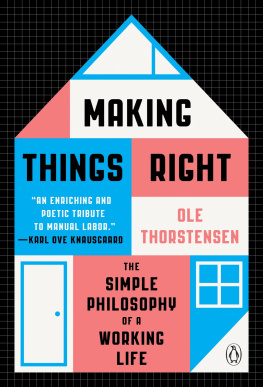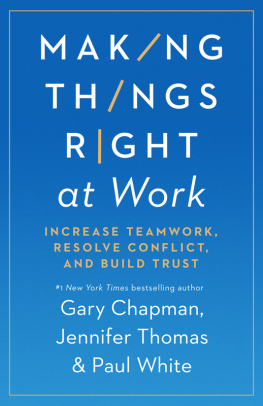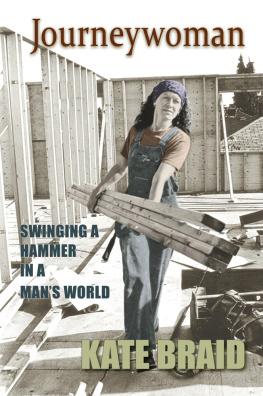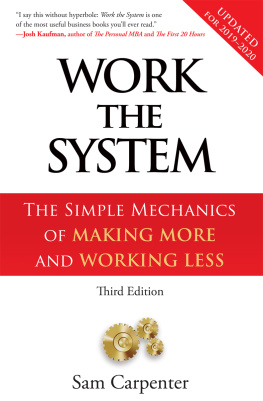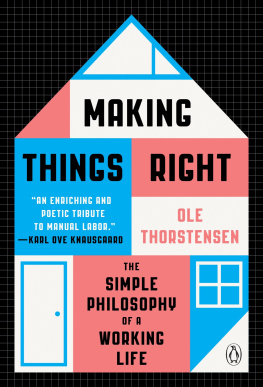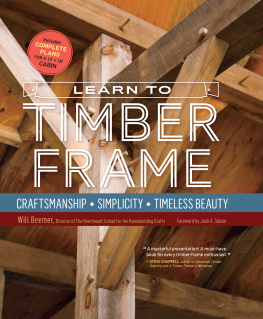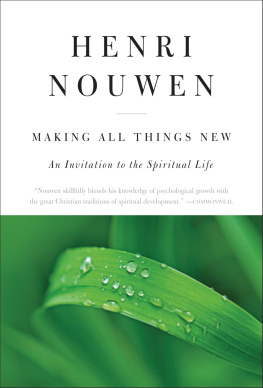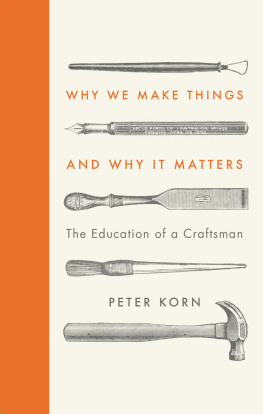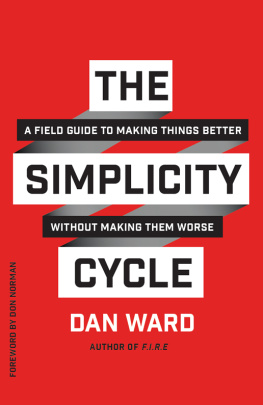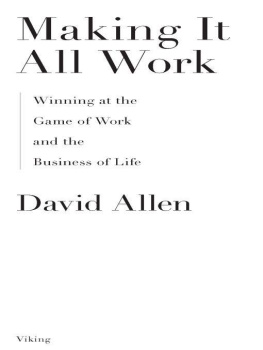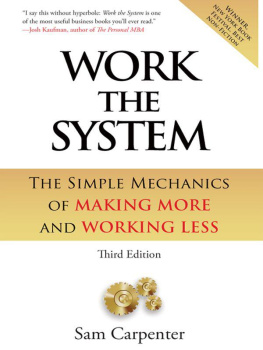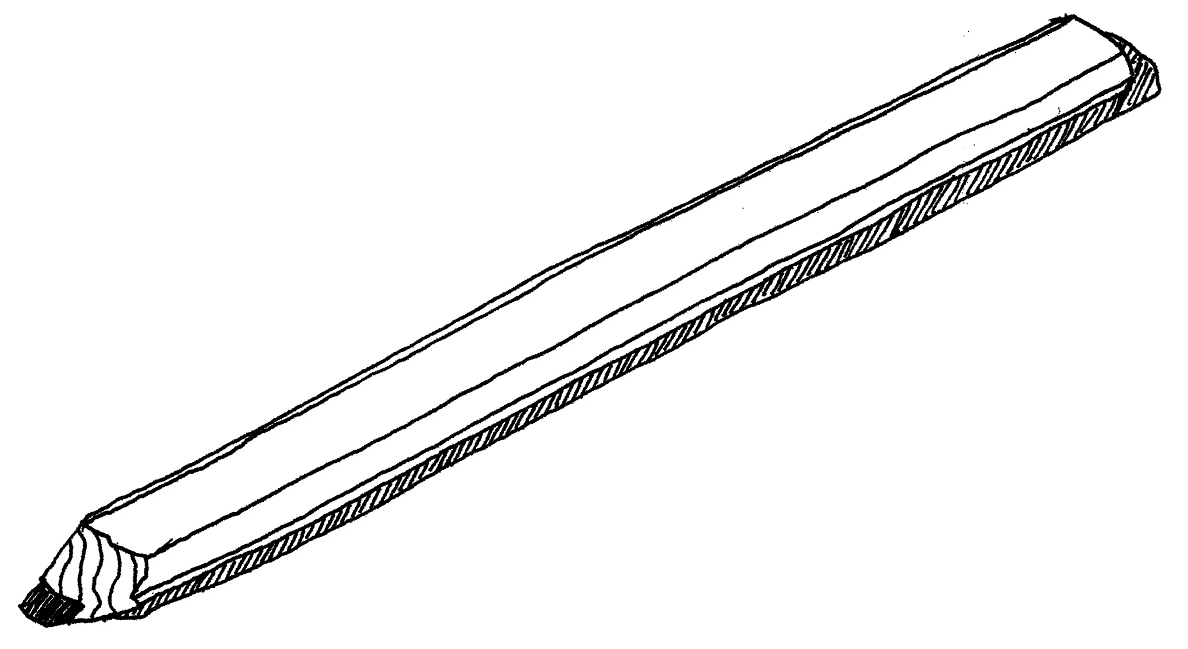A glossary of terms is to be found .
1
I work with wood. Having been a certified apprentice, I am now a qualified master craftsman, what most people refer to as a carpenter.
I learned the trade as an apprentice, and as a master I learned how to run a business. For me the craftsmanship, the work itself, is more meaningful than the management side; therefore my certificate of apprenticeship is more important to me.
There is nothing mysterious about skilled manual labor. My job is done to order and is wholly dependent upon demand, upon the instruction of others.
I am a contractor, an entrepreneur, and a businessman. These are the words used to describe what I do. I am a carpenter, this is the word I use, and I run a one-man carpentry firm.
The smaller firms in the building trade carry out what can be termed minor jobs, the larger companies are not that interested in those types of contracts. They are busy building whole new housing developments, hospitals, schools, sometimes a kindergarten and smaller commercial premises.
The smaller contractors put in new bathrooms, one by one; they replace windows in houses, and erect garages. They also build a lot of new houses, as well as the board and pole for the mailbox outside. A large amount of the maintenance and modernization of the almost two and a half million residences in Norway is carried out by smaller contractors.
There are a lot of us and we are to be found everywhere, so it goes without saying we are a diverse group. We are part of the same industry, we are tradesmen, and the fact that we approach our jobs in different ways is something tradesmen know better than anyone. We are fast, slow, good, bad, grumpy, happy, cheap, expensive, honest, and some of us are dishonest. All descriptions are relevant to the trade, with craftsmanship and its application.
I live in Tyen in Oslo and work for the most part in the city, chiefly on the east side. Sometimes I work on the west side, and I have had jobs in places as far south of the city as Ski and s, and as far west as Asker. Not being native to Oslo, I have got to know the city through my job. When I am walking around the city with other people I can sometimes come to a halt, point, and say, I replaced a door in that place, I converted an attic in there, I renovated a bathroom in that house. For a man with no sense of direction it is a handy way to get to know the city, because I never forget a job I have done.
I have no employees, no office or premises of my own. My tools are kept in the storeroom of my flat, along with equipment and materials that cannot withstand frost, cannot be outside, such as glue and the like. Screws, nails, and all sorts of other things are up in the attic. My tools are an extension of me; by treating them with care I show the respect I have for the profession, the work, and for myself.
I park my vehicle, a slightly run-down panel van, wherever I find a spot for it in the streets around where I live. Every day after work I carry all my equipment up to my flat. Leaving tools lying in plain sight is not a good idea. Should anyone look through the windows they will see that the van is empty and there is no point in breaking in.
My flat is on the third floor, which entails lugging stuff up and down. I have become better at planning what is required for each job and now I take only what I need to when loading the van, saving time and avoiding too much back and forth.
My living room doubles as an office. The flat is not big, so I put any files and paperwork in a closed cabinet to keep them out of sight. Administrative work has to be done, but having the office at home like this can be tiresome. It feels as if I am always carrying a heavy rucksack, even after the trek is over. I never quite make it to a point where I can rest, take a break, and turn around to look back over the landscape I have passed through. When I have finished the work, the actual building, I have to open the cabinet, take out the relevant file, boot up the computer and pay VAT, write e-mails, archive documents, fill out forms, and calculate tenders. The hours I spend on this feel long, much longer than the hours I spend with materials and tools.
My company is a one-man business and there is no clear distinction between my private and professional life. I am in physical contact with the tools and materials I use and am likewise bound to the finances and consequences of my labor. There is a close connection between me and my drill, my van, the floor I am laying, the house I am building, and also the balance sheet.
At times this can feel overwhelming, but not simply in a negative way. It gives me a strong sense of my work not only being of great significance to the clients who ask me to renovate their homes but to me too. Financially and professionally, I am exposed, devoid of the protection most people take for granted in their everyday working lives.
I make a living from producing transient objects that can be replaced and demolished. That is also a part of my profession. The things we surround ourselves with are crucial to our lives, and at the same time are unimportant, and that is the reason we can say that it went well, no lives were lost when the cathedral burned down.

